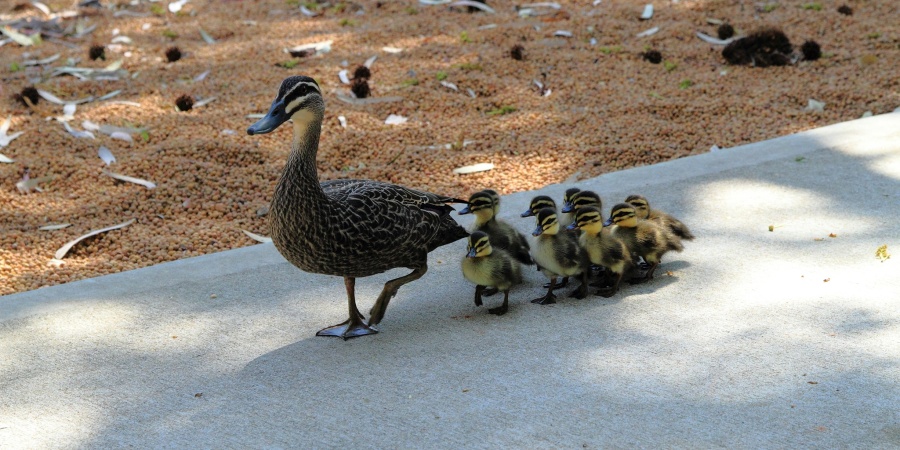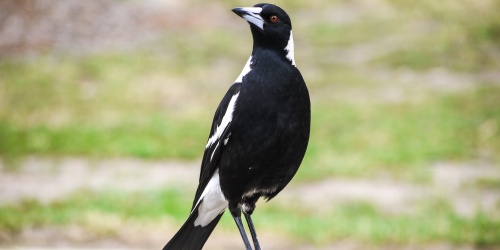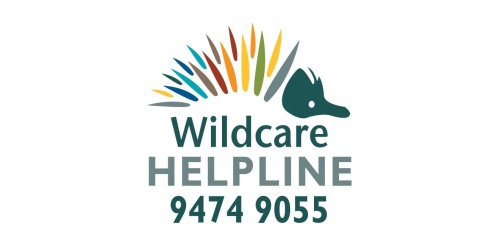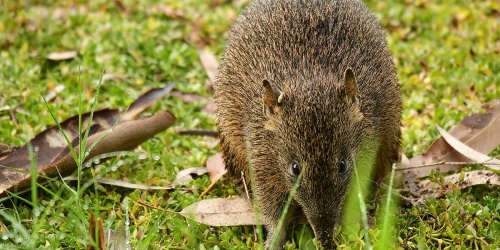
Ducklings on the move Photo/DBCA
Helping sick or injured native animals
If you come across a native animal that appears to be unwell or injured, there are several steps you can take to ensure that they receive the appropriate care and treatment they need, while minimising risks of further harm to the animal or to yourself.
If you find sick or injured wildlife, the best thing you can do to increase their chance of survival is to call the Wildcare Helpline on (08) 9474 9055 for advice and if appropriate take them to a licensed wildlife rehabilitator or vet. If the sick or injured animal is a marine mammal (e.g. entangled dolphin, stranded whale, injured seal) please keep a safe distance and call Wildcare.
To assist wildlife rehabilitators and the future release of the injured wildlife, take note of the location where you found the animal, the time of day, and what condition it was in when you found it.
Use the following information to first recognise signs of illness or injury in specific animals.
Injured and abandoned young birds
In spring and summer, it is common to see young birds sitting or hopping on the ground without their parents. Although it may be tempting to rescue a young bird on the ground, it is generally unnecessary and can decrease its chances of survival.
- If the bird has feathers (a fledgling), leave it alone and observe it from a distance. The parents are probably not far away and will return with food within several hours.
- If the bird has fluffy down and no feathers (a nestling) it has likely fallen out of its nest. If it seems healthy and uninjured, try to return it to the nest or somewhere off the ground and out of danger. Parent birds will not reject their young if you pick them up, contrary to popular belief, as birds generally have a limited sense of smell.
Ducks and ducklings
- July to September is breeding time for ducks - before then they are looking for safe places to nest and raise their young.
- Ducks are drawn to swimming pools due to the absence of predators but finding food can be challenging. Turning off the filtration system is recommended to avoid duckling injury. To assist ducklings in exiting the pool, a ramp or shade cloth/lattice fencing can be placed alongside the pool.
- When a mother duck moves her young, keep gates open, pets inside, and cover the pool. The journey can be lengthy and may include crossing roads and cycle paths. Ducks can disrupt traffic, so drivers should slow down. If a duck is in danger on or near a road, contact the police on 131 444, as they are the only ones authorised to control traffic.
- If you suspect ducklings have been abandoned, keep in mind that it's common for the mother to leave them alone for a few hours while she goes to feed. Observe the situation from a distance for a while to see if she returns.
How to handle small injured wildlife
- Wildlife can only be rehabilitated by those licensed, or taken to a vet
- Remember your own safety as well as the safety of the animal
- Be careful of teeth, claws, beaks, etc., when approaching and handling
- Contain the animal securely to prevent further injury
- Use a towel or similar item to pick up the animal gently
- Place the animal into an appropriately sized, ventilated box
- Keep the animal warm, in the dark, and in a quiet place
- Do not touch or handle injured wildlife unnecessarily
- Use suitable protection when handling bats, such as thick leather gloves
- Do not offer food or water unless advised by a rehabilitator
- Always wash your hands thoroughly after handling wildlife
Injured kangaroos
Beware of kangaroos, as they have powerful kicks and sharp claws that can be dangerous. Injured animals may be stressed and behave unpredictably. Do not approach or try to catch an injured kangaroo, as it may result in further injury and unnecessary stress. Remember that the animal is wild and may feel threatened by your presence, so stay calm, speak softly, and move slowly. Secure the area and prevent others, including pets, from approaching the injured animal. Watch from a safe distance to see if the animal requires assistance.
Take care to look for any young animals in the surrounding area. If you encounter a joey, wrap it up to keep it warm and seek advice from the Wildcare Helpline.
When near a road, exercise caution and prioritise your safety by being mindful of traffic. Avoid walking onto a road that is busy or hazardous and seek assistance from the police (131 444) or Main Roads (138 138) if there is a road hazard.
Seals
Certain behaviors exhibited by seals may be mistaken as indications of injury, when in fact, they are simply resting for extended periods of time. While seals may suffer minor injuries, most are superficial and will heal on their own, allowing for quick recovery. Fortunately, reports of sick or injured seals often turn out to be false alarms and, in most cases, seals do not need human intervention.
Avoid any interference with their natural behavior. Disrupting seals on land or in the water can cause a decrease in their feeding and resting time, leading to potential declines in their physical condition.
Consult the Be Seal Wise page to confirm if the seal needs assistance.
Dolphins and whales
If you come across a stranded, entangled or distressed whale or dolphin, remain calm and call the Wildcare Helpline with information on the animal's location and type of injury.
Safety is a primary consideration at strandings. Whales can roll onto people in the water near them, so we ask that you maintain a safe distance from any animals and follow the instructions of DBCA’s Wildlife Officer. Whales and dolphins are powerful animals and can cause serious injuries.
- Avoid standing close to the head or tail and refrain from touching the animal, pushing or pulling on the flippers, flukes, or head, or covering the blowhole.
- Minimise noise to avoid further distress of the animal.
- Pouring water over a dolphin or whale can be harmful, as accidentally getting water in the animal’s blowhole can lead to drowning. However, if sunburn and drying skin condition is of concern, a DBCA officer may seek to wet the skin with buckets of water or wet towels while avoiding the blowhole.
- Do not attempt to push the animal back to sea, as it can worsen its condition.
- Do not apply sunscreen to the animal, even if its skin appears to be burnt.
If you find a sick or injured animal contact the Wildcare Helpline on (08) 9474 9055 for information on licenced wildlife rehabilitators and centres.


